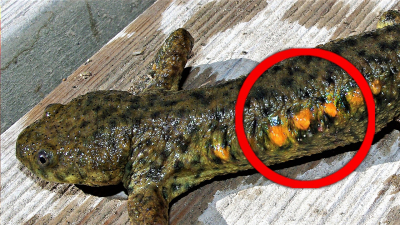
The process of evolution ensures that only living things that are suited, or adapted, to their environment will survive. An animal or plant that is poorly adapted to its surroundings soon loses out in the struggle for survival. Animals are adapted to three major features of their environment: the climate (including temperature and rainfall), the food sources available, and avoidance of predators.
Life thrives in its greatest diversity in warm and moist or wet conditions, such as tropical rainforests and coral reefs. Places that are very cold or very dry provide the greatest challenge to animal survival. Yet some creatures can live in even the driest deserts. They include large animals such as camels and oryx, and smaller creatures like jerboas, lizards, scorpions and insects.
In hot deserts, smaller animals often hide from the scorching sun by day and come out in the cooler night. They produce very little sweat, urine or other body liquids, thus saving valuable water.
Desert creatures have adapted in various ways to moving over soft sand. The camel has very wide feet so it does not sink in. Jerboas and gerbils hop and leap on their large back feet. The sidewinder snake moves its body diagonally in a series of Z-shaped stages, pushing sideways against the loose grains. Some desert-dwellers, like the water-holding frog, burrow underground and sleep through the worst of the drought.

Only warm-blooded birds and mammals are able to live on land or in the air in the Earth’s coldest regions, the Arctic and Antarctic icecaps. Reptiles and amphibians would simply be too cold to move. Musk ox, yak, seals and polar bears have thick furry coats to keep out the chill.

Marine polar mammals like walruses and whales have almost no fur at all. But they do have a thick layer of fat under the skin, called blubber, to keep in body warmth. Birds such as penguins also have blubber. Other birds, like the ptarmigan and snowy owl, have extra-thick plumage. They can fluff out their feathers to trap a layer of air which keeps out the cold.

One of the most varied habitats is the coast. The main change here is the twice-daily rise and fall of the tide. Animals such as crabs, worms, shrimp and shellfish are adapted to being active when they are covered by the seawater—whether it is day or night, winter or summer. Shellfish like limpets have strong outer cases to prevent them drying out at low tide and also being smashed by the waves. Soft-bodied worms and fish burrow in sand or hide under rocks for protection against winds and waves.
One of the most constant habitats is the bottom of the sea. It is always dark and cold, with few water currents. The main problem at great depths is the enormous pressure of the water. Deep-sea fish, starfish and sea cucumbers would go soft and floppy (and die) if brought to the surface.
























